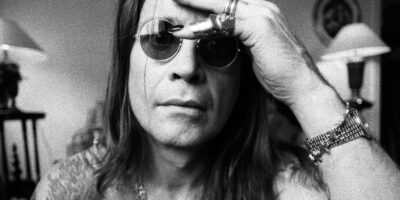Few artists come to the table with a debut as fully realized as Bartees Strange’s LIVE FOREVER, and that’s no accident. In many ways, this record is a “debut” in the more traditional sense—not simply the beginning, but an announcement. LIVE FOREVER’s utter disregard for genre convention has captured the minds of media and fans alike with its musical and thematic complexity and fluidity.
—
Bartees Cox Jr.’s musical journey begins as a child in suburban Yukon, Oklahoma. A quick survey of the streets of Yukon tips its hand immediately. Many of its storefronts resemble, at least outwardly, the general stores of old Western films, and other than a few small flecks of faux-metropolitan gentrification chic, it seems to embrace this wholeheartedly. Yukon’s most famous resident (for now) is country megastar Garth Brooks, now the namesake of a major street, which Cox recalls as near his own childhood home. He describes country and Americana music as a key piece of his musical development, and those sounds shine through on LIVE FOREVER’s second single, “Boomer,” which deftly leaps between indie rock, rap, and a thrilling blues-punk bridge. “I really fell in love with a guitar shop by my house, and there was this guy named Dale who played incredible clawhammer-style guitar,” Cox says. “That was my first scene. Walking down to the guitar shop and having my little portable recorder on and copying everything those guys did.”
Country music stuck with Cox as a musician on its own merits, but he also saw it as a gateway to the worlds of post-hardcore and emo music, where he made his early career as a musician with bands like Brooklyn post-hardcore group Stay Inside. And, unsurprisingly for someone as adept at genre fluidity as he is, Cox sees strong connections between the musical worlds he spent time in during his teenage years in Oklahoma and his later work. “As soon as I learned about pedals, I realized these bands are just taking country chords and voicings! It’s the same shit.”
Cox and his family, led by his mother Donna, an opera singer and voice professor, also found themselves frequently performing at church services. “When my mom wasn’t teaching or singing for herself, she sang at churches,” he says. “Me and my brother and sister were always in church too, so we were always singing.” Even if praise music isn’t something that stuck, the experience of performing with a full band to a crowd so eager to be moved through music left a lasting influence on him that spurred him towards 12 years of unrelenting work toward a professional music career. “Church was definitely how I fell in love with music as an emotional driver, and understood what it can do to you and how good it can make you feel. I believed in the music more than the words. And I definitely think I fell in love with music because I learned how to feel music first. That’s what people wanna hear.”
But even more impactful than this absorption of the world around him was the way that theworld reacted to him—both in terms of the music he came to love and his experience as a Black and queer man in rural, racially homogenous, and heavily religious Oklahoma. “I’ve had a lot of people from Mustang reach out to me pissed off,” he says. “I talk a lot of shit about where I grew up. I had a really hard time there, and a lot of people don’t want to admit that that’s the reality. And it’s a shame that so many Black people live through that and don’t get to experience anything better, and those white people should know that it’s just that hard.”
—
Black artists in indie rock circles are particularly disregarded by established media outlets. Cox has made it a mission to spotlight both the necessities of embracing the creativity of Black musicians and the larger issues that are created when that creativity is not embraced. When we talk, he speaks enthusiastically about watching TV on the Radio’s legendary 2006 performance of “Wolf Like Me” on Letterman as if he’s still processing the impact it had on him. The image of Tunde Adebimpe “as a Black man, singing a song called ‘Wolf Like Me’ in reference to himself,” directly informs a lyric in LIVE FOREVER single “Mustang”: “You’ve never asked a beast from the southern coast.” “That means ‘You’d never give me this chance to express myself this way.’ Those songs changed my life, and that’s the point of the record for me.”
Cox singles out glitchy and abrasive hip hop interlude “Mossblerd” as a “manifesto.” LIVE FOREVER, even amidst its well-earned musical confidence and wizardry, is peppered with expressions of anxiety and self-doubt, and “Mossblerd” is the subtext of those instances being brought directly into the face of the listener. “It very clearly lays out what I see as the connection between genres and stereotypes and limits and restrictions on who you see yourself becoming and what you think you’re capable of.” In a taut verse, Cox draws clear lines between the lowered ceilings and enclosed boxes that Black artists are subject to and the consequences of a world in which their contributions are accepted into the cultural conscious without recognition or compensation.
Earlier this year, Cox took a baseball bat to those boxes with his excellent EP SAY GOODBYE TO PRETTY BOY, which consists almost entirely of covers of The National. He’s very clearly an avid fan who claims that he could talk about them for hours at a time (to which I was forced to respond: don’t threaten me with a good time) and singles out the work of the Devendorf rhythm section as some of the best in music and an influence on LIVE FOREVER. However, when Cox and longtime friend and drummer Carter Zumtobel first saw the band live, it will likely not surprise you to hear that he was the only Black person in the crowd. SAY GOODBYE TO PRETTY BOY was both an homage and a critique of the National’s work, with some songs receiving reworked lyrics and all receiving new arrangements. “There are some songs on there that I thought I could bring new meaning to. In ‘Mr. November,’ Matt Berninger says ‘I’m the new blue blood / I’m the great white hope,’ and I wanted to sing those words.” Cox, who is releasing his first record as Bartees Strange at 31, sees the National’s career arc—from 30 -somethings in Cincinnati to beloved and pioneering alt-rock mainstays—as inspiration for his own. “The way they’ve built themselves is like a physical structure. They get a little better every year, the fans get more into them every year, and now they can just put anything out and all their fans are going to buy it. And they work really hard, but they’ve got the house, beautiful families, great lives, they look happy and healthy. I feel like that’s doable.”
—
What becomes incredibly clear after speaking to Cox for, really, any amount of time, is how much thought and preparation has gone into this moment for him. On top of full-time work for a nonprofit pursuing climate justice, he’s spent any free time available playing in other bands and making connections with other musicians and artists. “You just gotta go that hard to make it work sometimes. My whole life for the last 12 years has been planning systematically and building a foundation so that I could do this one day.”
He began writing and polishing the songs on LIVE FOREVER during live performances throughout 2019 and found himself heading into 2020 with a finished record and funds saved for its rollout. When the pandemic hit, Cox found himself at a decision point, ultimately deciding to bet on himself by rolling the dice and releasing an album. Despite all of the obvious risks in play, he believes that being an independent musician gave him a chance to come out ahead of others who are more beholden to the existing industry. “We don’t have big budgets or anything. We’re just normal people. And right now, I have this sense that people who have access to those things are limited by the pandemic. They can’t do all that right now, and I can do all of this shit myself. I taught myself how to make things, and I’m not gonna run out of stuff to make. If it doesn’t work for us, we’ll just make another record.”
Since that decision was made, Bartees Strange has gone all in on embracing the situation created by necessary adjustments during the pandemic. Each of the three music videos from LIVE FOREVER were filmed in Cox’s house, and the end results are compelling and thoughtful versions of the aesthetic of the shelter-in-place concert. “Once we decided we were going to put the record out, I decided to just shoot everything inside my house,” he explains. “I admit that the record has been kind of intimidating, because there’s a lot of sounds and words and ways of singing, and I wanted to have as many opportunities as I could to tell my story and explain what was going on and allowed me to show different sides of myself. I found that with those limitations, it was easier to do that.”
The unique circumstances of rolling out a new album and building a fanbase online is something that he’s embraced as well. “I miss meeting people in person. I miss talking to people at shows. But I think it’s been cool in other ways. I think people are more vulnerable online. They’re a little more quick to tell you what a song might mean to them. Like, someone reached out to me and asked me to sing a song at their quarantine wedding, and I’ll never forget that. There’s some moments that are really beautiful in this dark system that we’re in right now.”
—
The world is careening into the unknown more and more every single day, and you can’t say the word “unprecedented” ever again because of just how fucked up things have gotten. Nevertheless, there may not be a better word for what Bartees Strange brings to the table than that, and he knows it: his first reaction to the finished LIVE FOREVER was that he was out of his own mind. “I knew I’d love to hear a record like that, but I didn’t think anyone else was going to like it.”
If any doubt was left after the reaction it’s received, he was right about a lot of things but wrong about that. LIVE FOREVER immediately feels like essential listening. To experience these songs is to watch a motorcycle stuntman clear a line of school buses and spend days upon days wondering how they pulled it off, knowing that maybe they’re not totally sure either. In every sense of the word, Bartees Strange is unique—the way he plays guitar, the way he sings, the way he writes, and the way he thinks musically. He’s unique in the way that he offers so much of himself in his music, and in the face of so much potential resistance both from internal and external forces
And even if that feeling does get to be internal sometimes, for Bartees Strange, LIVE FOREVER is an artifact of his own self-actualization. “I realized ‘This makes sense because it’s you. You made it. You’re enough to hold it together.’ There’s so many opportunities to second guess yourself and the things that you want and the things that you’re passionate about. And once you can say those things out loud, and believe in yourself, and walk in that, things happen.”
















Comments